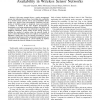Free Online Productivity Tools
i2Speak
i2Symbol
i2OCR
iTex2Img
iWeb2Print
iWeb2Shot
i2Type
iPdf2Split
iPdf2Merge
i2Bopomofo
i2Arabic
i2Style
i2Image
i2PDF
iLatex2Rtf
Sci2ools
110
click to vote
INFOCOM
2009
IEEE
2009
IEEE
Using Failure Models for Controlling Data Availability in Wireless Sensor Networks
— This paper presents Pirrus, a replica management system that addresses the problem of providing data availability on a wireless sensor network. Pirrus uses probabilistic failure models (e.g., derived from environmental conditions and estimation of available energy) to adaptively create and maintain a number of replicas of the data. Replica management is formulated as an energy optimization problem, then solved with a greedy heuristic that only uses information gathered from neighbors. Intuitively, Pirrus trades off the energy saved by limiting the number of replicas when the network health is good to extend the lifetime when more replicas are needed. Our simulation results show how the solution provided by Pirrus achieves good performance with a sustainable computational cost. Compared to the performance of a fixed number of replicas, Pirrus extends the network lifetime by more than 20%.
Related Content
| Added | 24 May 2010 |
| Updated | 24 May 2010 |
| Type | Conference |
| Year | 2009 |
| Where | INFOCOM |
| Authors | Riccardo Crepaldi, Mirko Montanari, Indranil Gupta, Robin Kravets |
Comments (0)

